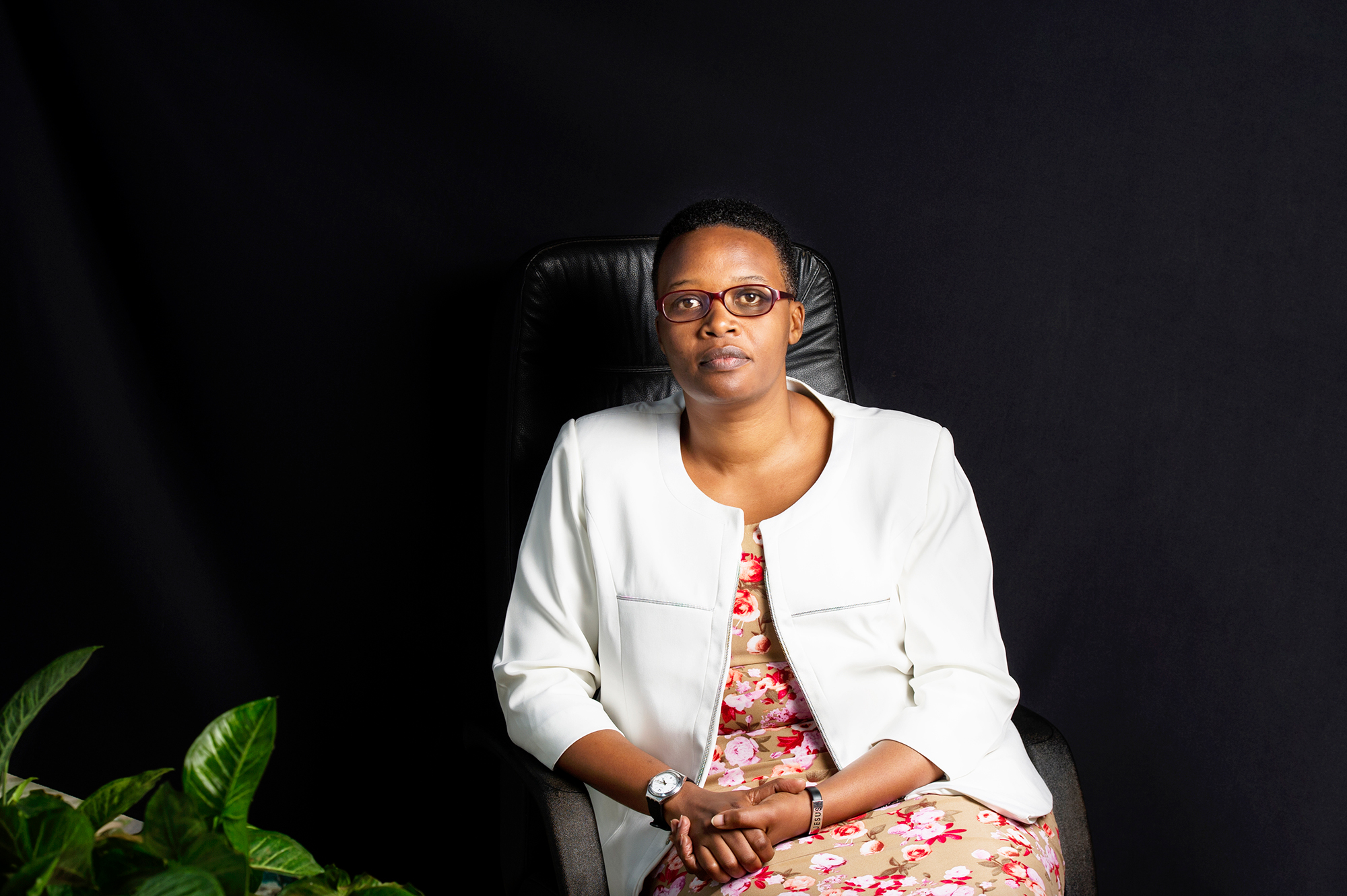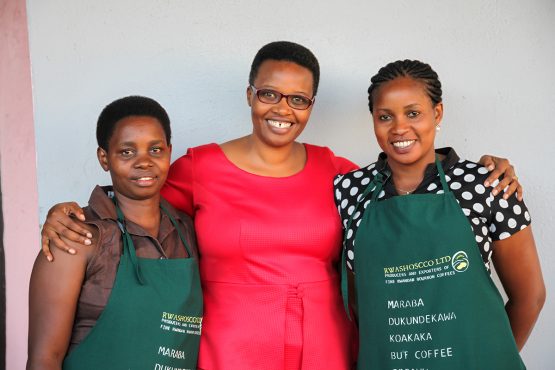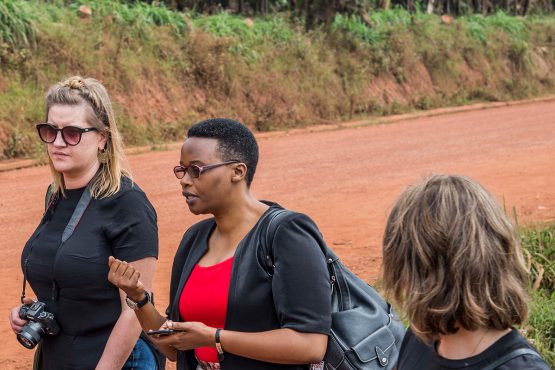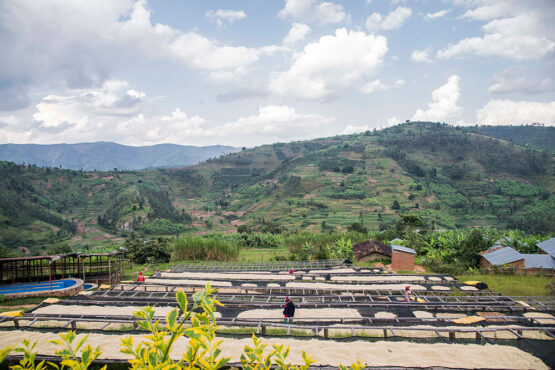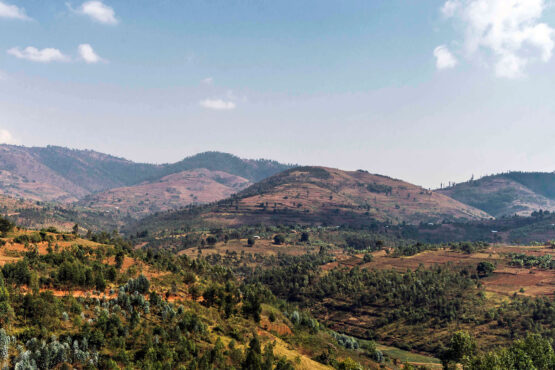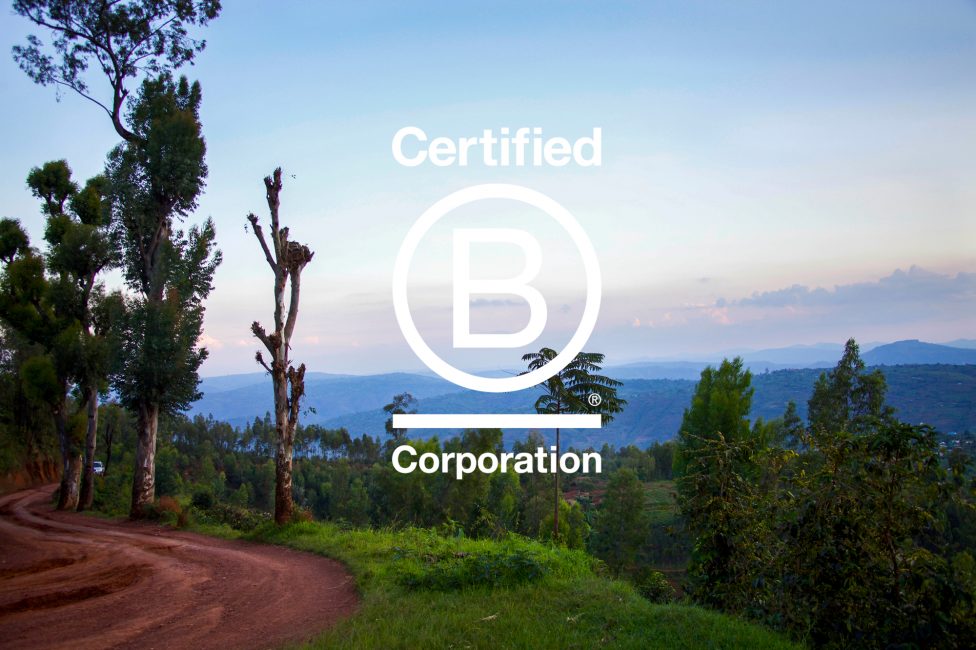Meet Angelique Karekezi
Published 26 Sep 2022
Angelique Karekezi is the powerhouse managing director of Rwashoscco, a farmer-owned marketing, exporting and roasting company through which we source many of our Rwandan offerings. Along with her peers, Angelique’s hard work and determination has been instrumental in establishing Rwanda’s specialty coffee industry and leading it towards a more sustainable and profitable future.
MCM has had the pleasure of working closely with Angelique since 2014, when she first stepped into the managing director’s role at Rwashoscco. Since then, we have relied on her expansive knowledge and skills in strengthening our Rwandan sourcing program and in connecting us to many key coffee-producing communities. We feel incredibly fortunate to work with her in a professional sense, and to count her as a friend.
We recently caught up with Angelique to learn more about her role at Rwashoscco, and her goals for the industry at large. A must-read for anyone who loves Rwandan coffees as much as we do, grab yourself a cup of coffee and check it out below!
MCM: How would you describe what Rwashoscco does?
Angelique: Rwashoscco is a marketing, roasting and exporting company for coffee produced by its 6 shareholders, which are made up of five cooperatives and one family-owned company. It sells coffee to local and international markets through two channels: green coffee directly from farmers to buyers, and roasted coffee from roasting plants in Kigali (Rwanda) and Hamburg (Germany) to the final consumer. Rwashoscco has two roasted coffee brands: Café de Maraba, our first and most well-known brand, which is sold mostly locally; and Angelique’s Finest, a brand fully produced by women, which is sold internationally (particularly in the German market).
What is your role at Rwashoscco?
I am the Managing Director at Rwashoscco. I coordinate all activities regarding marketing, selling and exporting of our farmers’ green and roasted coffee, on both local and international markets.
“On a personal level, coffee is my world, I have many friends all over the world from this sector and working in this industry for so long has made me who I am today. In other words, I don’t see myself in working in any other sector”
Angelique Karekezi
Are there any specific projects you and Rwashoscco are focusing on at the moment?
Currently, our main project is to increase sales of our coffee as a finished product (that is, roasted coffee). Within the framework of this project, our farmers and Rwashoscco staff hold various capacity building workshops that focus on the consuming market’s requirements. We work closely with our partners on the market side of things to help us to strengthen our coffee brands and increase our competitiveness in the market.
Since January 2022, we have also worked on improving our women farmers’ financial independence. We started providing training sessions on financial literacy, to educate farmers on ways to invest their coffee income into other income-generating activities and general financial management.
That’s a lot! Who makes up the team you work with?
In our team, everyone participates actively according to her/his task and skills to perform it. Our general cooperation and teamwork strengthens the team. We have top management members who are in charge of everyday activities, including our Managing Director, Operations Manager, Chief Accountant, Quality control and Export Officer, Food Safety and System Management Officer working together with the Chief Roaster, and the Board of Directors, who direct the company as a whole.
How long have you been working in coffee?
I have been working in coffee industry for 19 years, since March 2003.
Nineteen years is such a long time! How did your career in coffee begin?
I started my career as the accountant of KOAKAKA cooperative, one of Rwashoscco cooperative members. Within that first year I became the cooperative’s executive secretary, a position I held for three years.
I then moved to a USAID project where I supervised 6 cooperatives in different tasks like management, administration, and certification. From 2008, I joined Rwashoscco as Chief accountant and have been the Managing Director since 2014.
Clearly you have a lot of love for coffee and this industry, then. Why would you say that is?
Coffee is a cash crop, it provides the funds to many families in my country that support various activities – such as children’s education, health insurance, etc. In addition, through Fairtrade premiums, coffee farmers’ cooperatives finance communal projects such as roads, bridges, water supply for public utilities, etc. Coffee also creates jobs for thousands of people in my country involved throughout the whole value chain.
On a personal level, coffee is my world, I have many friends all over the world from this sector and working in this industry for so long has made me who I am today. In other words, I don’t see myself in working in any other sector.
Coffee has had a huge impact on Rwanda’s post-genocide recovery. From your perspective, could you tell us a bit more about how it has done this?
The coffee business has positively impacted Rwanda’s recovery in many important ways:
- Coffee contributed to restoring our country’s image in the eyes of other countries all over the world by showing a different story about Rwandans, and Rwanda in general.
- For farmers, especially those in cooperatives, the coffee business contributed a lot in their personal economic recovery as well as in reconciliation and unity after the 1994 Genocide against the Tutsi people, because everyone has joined hands and worked together within the cooperatives.
- The coffee business also contributed a lot in job creation and income generation to all actors in coffee value chain: farmers, processors on different levels and exporters.
- And finally, the coffee business contributed a lot in Rwanda’ economic recovery, as it has become one of the main pillars of our country’s economy.
In recent years, we’ve been excited to see the work of women in coffee being highlighted and celebrated more. Why is it important to you to represent women in coffee?
It’s important to me to represent women in coffee, as it’s a way to showcase my female compatriots’ contribution to the coffee sector. I have had a good opportunity to meet different women in coffee from all over the world; and I have been inspired by some of them in the ways I can help our women in the Rwandan coffee sector, from farmers’ level to exporters’ level – especially by highlighting their efforts and contribution to the coffee value chain, which has helped increase their income.
And finally, what does the future hold for you and for Rwashoscco?
For me, I would like to continue to be the voice of farmers in the market where they can sell their products through different channels. Rwashoscco will maintain and sustain the existing markets and create other opportunities for farmers to improve their business and their livelihood.
